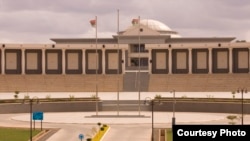BLANTYRE —
The Malawi government has put austerity measured into place that are aimed at controlling government expenditures following the suspension of donor support in the wake of a growing corruption scandal known as "Cashgate." Last week, donors halted $150 million in funding to the Malawi government. The money will not start to flow again until donors are satisfied with the outcome of the investigation into the scandal, which saw more than $250 million looted from government coffers.
Malawi’s Minister of Finance Maxwell Mkwezalamba noted that the measures also include a ban on travel for government officials.
“The measures focus largely on expenditure cuts, including those related to travel. So travel has been suspended with an immediate effect, both internal and external. However, there will be some exceptions where you have political travel upon approval, but also fully funded travel will be permitted,” explained Mkwezalamba.
Mkwezalamba said that only three people will be allowed to make a ministerial delegation, and that each ministry will be allowed only three pool vehicles to cut down on fuel and other costs. He said the government has also suspended the commissioning of any development projects that have not yet begun.
The finance minister brushed aside fears that the government will introduce new taxes to keep up with its finances or borrow from local banks.
“We already know that the existing tax rates are such that the investment environment is conducive, so we would not resort to increasing tax rates. I think, if anything, what could be done is to enhance revenue collection,” Mkwezalamba said.
Mkwezalamba noted that the government has not resorted to borrowing because of the negative consequences it may bring to the country’s economy in terms of increasing interest rates and inducing inflation. Economic commentators have hailed the move and asked the government to be practical. They note that the previous administration attempted to implement similar measures when donors withdrew aid, but fell short.
Malawi’s Minister of Finance Maxwell Mkwezalamba noted that the measures also include a ban on travel for government officials.
“The measures focus largely on expenditure cuts, including those related to travel. So travel has been suspended with an immediate effect, both internal and external. However, there will be some exceptions where you have political travel upon approval, but also fully funded travel will be permitted,” explained Mkwezalamba.
Mkwezalamba said that only three people will be allowed to make a ministerial delegation, and that each ministry will be allowed only three pool vehicles to cut down on fuel and other costs. He said the government has also suspended the commissioning of any development projects that have not yet begun.
The finance minister brushed aside fears that the government will introduce new taxes to keep up with its finances or borrow from local banks.
“We already know that the existing tax rates are such that the investment environment is conducive, so we would not resort to increasing tax rates. I think, if anything, what could be done is to enhance revenue collection,” Mkwezalamba said.
Mkwezalamba noted that the government has not resorted to borrowing because of the negative consequences it may bring to the country’s economy in terms of increasing interest rates and inducing inflation. Economic commentators have hailed the move and asked the government to be practical. They note that the previous administration attempted to implement similar measures when donors withdrew aid, but fell short.
